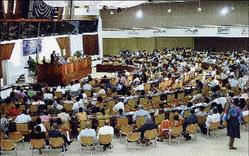Tyrone Reid, Enterprise Reporter

Jamaican Diaspora Conference at the Jamaica Conference Centre on Tuesday, June 17, 2007. - Peta-Gaye Clachar/Staff Photographer
Jamaicans in the diaspora are tired of being seen as just a big wallet with a wad of cash. They want to be afforded the opportunity to contribute more than just remittances to the country's development.
Some members of the diaspora believe that just the sheer number of persons of Jamaican descent, in addition to native Jamaicans who are now living outside the country, demonstrates that the diaspora can prove to be a force to be reckoned with in moving the country forward
More Jamaicans LIVING ABROAD
Unconfirmed claims suggest that more Jamaicans and persons of Jamaican descent are living outside the island than those currently living here.
The Statistical Institute (STATIN) had no idea how many Jamaicans and persons of Jamaican descent are living outside the country. A representative from the institute's library told our news team that STATIN had no such statistic. However, STATIN was able to tell us that there were 1,341 returning residents in 2007.
Michael Oban, freelance journalist from the United Kingdom, believes that with the exception of remittances, the Jamaican Diaspora is largely untapped and thinks the link between the mother island and the diaspora needs strengthening.
"It could be tapped more, a lot more can be done," he said.
He also shares the sentiment expressed by other members of the diaspora that Jamaica is losing much by not exploiting the rich intellectual capital that those in the diaspora have to offer.
Diaspora loyalty
He also encouraged loyalty among the diaspora to the Jamaican cause, and urged his fellow members to maintain contact.
Interviews with members of the Jamaican Diaspora revealed that they are interested not just in finding jobs in Jamaica, but also in creating synergies with local businesses that can provide jobs.
During the telephone interviews, stories of frustration were told of how they have been met with resentment from some locals, who believe that they are coming to Jamaica to steal their jobs.
On the other hand, Philip Mascoll, journalist and immediate past president of the Jamaican Diaspora - Canada, who estimated that there were some three million Jamaicans and persons with Jamaican heritage living overseas, believed that the diaspora was not as underutilised as some of his colleagues were making it sound.
While admitting that the organised diaspora movement, which started four years ago, should have started much earlier, Mascoll said that the movement had made significant strides.
"(There is) a lot to do, but I think we are doing very well."
He believes the intellectual and skilled capital of the diaspora is being utilised. And, he was quick to note that there is no shortage of intellectual capital in Jamaica.
Groups across Canada
Mascoll pointed out that documentation shows that approxi-mately 300,000 Jamaicans are living in Canada with about another 100,000 undocumented. He said that the Canadian arm of the diaspora movement had some 2,500 contacts listed, who represented different groups across Canada that varied in size. As a result, his administration was in touch with thousands more through the contacts that they had established.
Against this background, Mascoll said he does not believe that the diaspora is largely untapped. "It is like a huge army and it is growing every day."
Still, some members are totally oblivious to the fact that there exists a structured diaspora movement that hosts a biennial conference in Jamaica. Just last month, the third such conference was staged at the Jamaica Conference Centre.
Erica Holness, who is a registered nurse in Florida, is among that group. She, too, believes the diaspora is largely untapped. "I did not know that there was a formal movement," she said. Holness has lived in the United States since 1992 but received her professional training in Jamaica. Now that she is aware, Holness plans to get involved with the movement. "It is interesting to know ... (Just recently) I was talking about the desire to give back in terms of medical equipment and I was not sure how to go about it."
Attempts to get a comment from the Ministry of Foreign Affairs and Foreign Trade were unsuccessful. A secretary told The Gleaner that Margaret Jobson, acting permanent secretary in the ministry, advised that we should contact Delrose Montaque, director of the Diaspora and Consular Division. Attempts to do so were not fruitful and Montaque did not return any of our calls.

